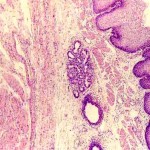

“Doctor, is it benign or malignant?” I asked while lying on the examining table waiting restlessly for the result of my breast ultrasound. The radiologist gazed into those ambiguous echoes on the monitor for a couple of minutes, and eventually she said: “Well, to me, it looks like a benign lesion”. “But…” she continued, “We have to rely on the pathologic diagnosis”. Fortunately, a core biopsy demonstrated a fibroadenoma, and I was flooded with ultimate relief when I heard the biopsy result. This is the unique beauty of pathology as a medical specialty; it is the most powerful weapon to reach an accurate diagnosis, and it gives you a conclusion.[ad#bannermain] As Sir William Osler put it, the pathologist is the doctor’s doctor. I believe that it is this unique feature of definitiveness that attracts me most to pathology. Making diagnoses is an intricate task that involves collecting, integrating and interpreting data obtained from a diverse range of sources. The intellectual challenges involved in deciphering these mysteries and the emotional euphoria of assisting patients with definite answers also immensely intrigue me.
Research interest is another important reason that I chose pathology. During my fifth year of medical school in China, I participated in a project to study the protective mechanism of a traditional medicine in a guinea pig asthma model which ignited my avid interest in research. Hence, after completing medical school, I came to the US to pursue a Ph.D. in molecular biology and pharmacology at the University of Big State Health Science Center. The 5-year Ph.D. training for me was both enlightening and rewarding. My work demonstrates that in addition to thiazolidinediones , rexinoids represent a second class of insulin sensitizing agents with potential application in the treatment of type 2 diabetes. These findings were published in the Journal of Biological Chemistry and Cell Death & Differentiation, and presented at several national/international conferences. I was honored with an achievement award and earned a top prize in the University graduate students poster competition. During this time and later postdoctoral work in the field of endometrial cancer, I have been closely collaborating with some outstanding pathologists, and I am always awed by their extensive knowledge, meticulous eye, analytical mind, and a strong sense of responsibility. It has made me realize that further residency training in pathology will afford me a more varied and balanced career. It will give me a unique platform to bridge basic research and clinical medicine, while applying the latest scientific discoveries to improving human health.
Making me a goof fit for pathology are not only my passion and solid research background, but my personal character as well. I have an inquisitive nature, an insatiable appetite for knowledge, and the discipline to maintain independent study. I have come to realize that constant study is not a tedious burden, but a luxurious pleasure. Also, I am a team player who loves working with others. All these mesh well with the field of pathology.
I am looking for a residency program that will provide rigorous and comprehensive pathologic training. I will devote my passion, energy, and medical expertise and research skills to serving my patients, to learning from my colleagues, and to educating medical students and young physicians. After residency, I plan to finish a fellowship in either oncologic pathology or ob/gyn pathology. I am currently completing an observationship in the Department of Pathology at the University of Large State Medical School at Metropolis, and this hands-on experience has me further convinced that the field of pathology is for me.